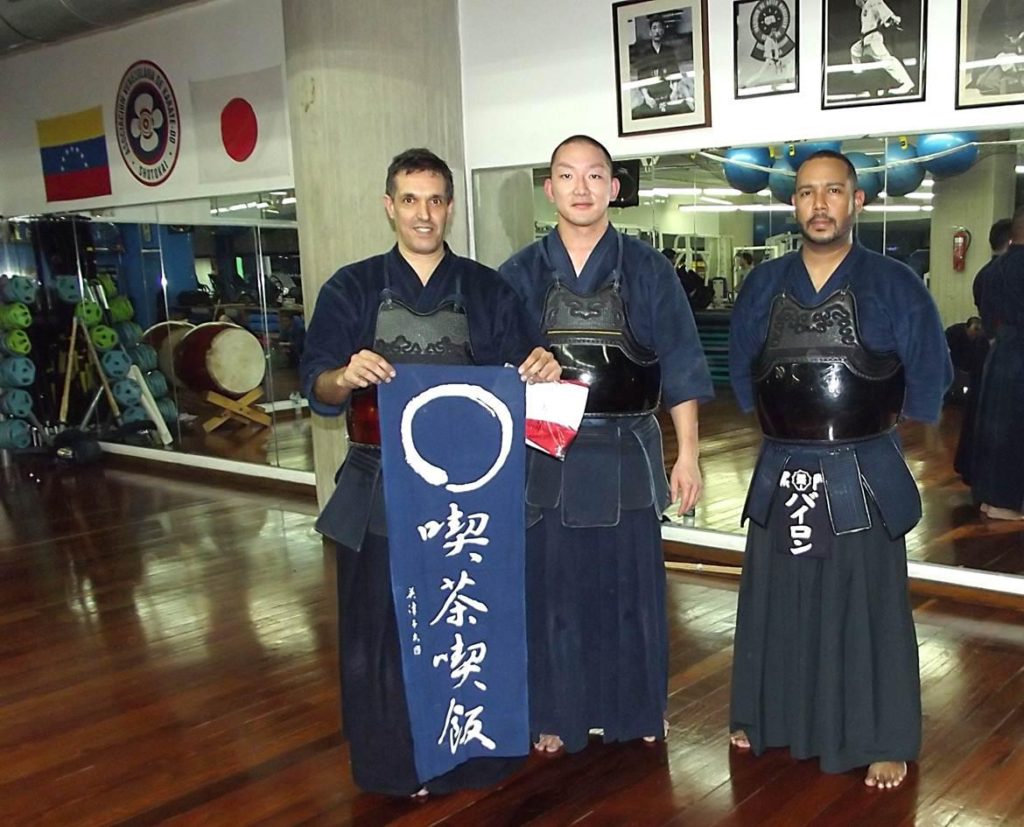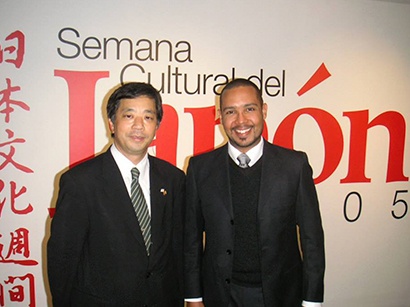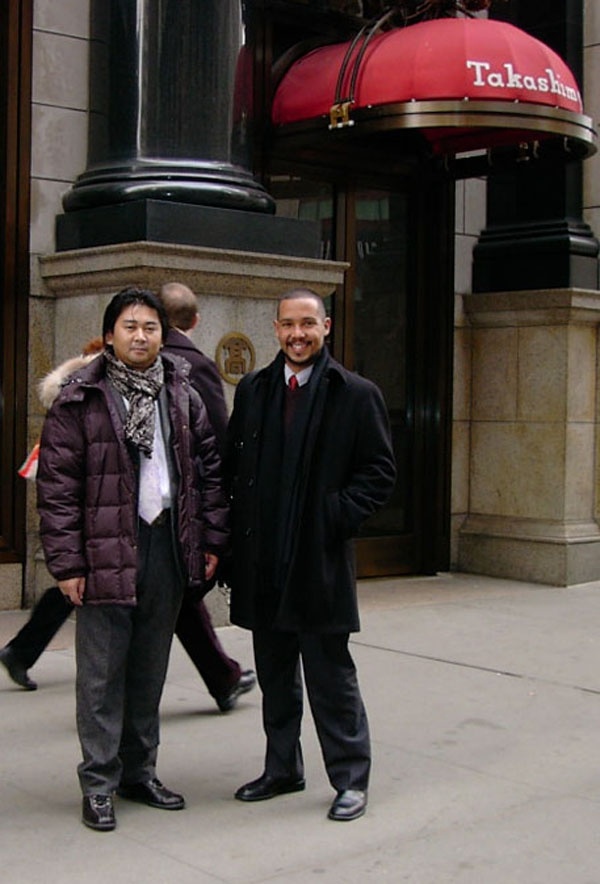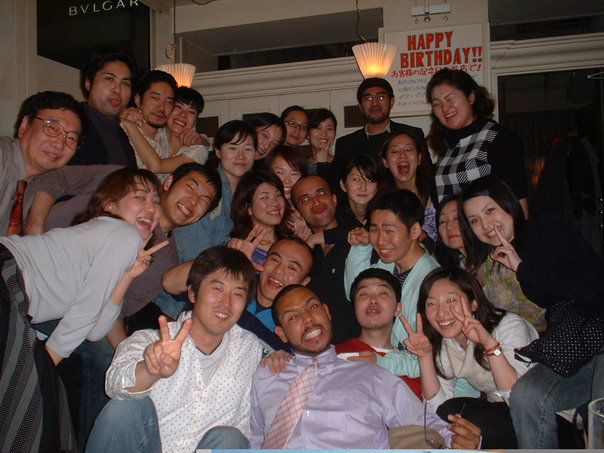Welcome to the Senpai Success Story, where you can read about others who have walked a unique career path using their Japanese language/cultural skills. (Senpai means “mentor” or “teacher,” and the concept is important to understand for anyone wishing to work in a Japanese business setting.)
Being creative does not necessarily mean being artistic or very active in any art field. Creativity can be applied and enjoyed within your tasks as teacher, engineer, businessperson, and of course, as a language learner. Creativity can be the source, the channel, and the goal to learn Japanese.
My name is Byron, and I want to share my story on how the decision to learn Japanese literally changed my life. It was 1999, in Caracas, and since it was my last year at the university, I had some spare time, and started looking for learning something new… Then, Japanese!
Japanese Language From Martial Arts and Leisure Time
My interest in Japanese culture is due to martial arts. When I was 6, my dad took me to karate lessons because I was having a hard time with bullying at school. Then, as I entered the dojo, I was totally dazzled. The tatami, the karategi, the ceremony before, during and after each class totally absorbed me.
10 years later I started practicing zazen, then Aikido (which continued in Japan, and trained with Kasia!), Kendo, and back at Venezuela, karate again. This love for Japanese martial arts ignited my interest in Japanese culture, inspired me to start learning Japanese language, and remains today.

I took Japanese for beginners at the Embassy of Japan in Venezuela, with my dear Miki-Sensei, an adorable lady who made each session a real experience in Japanese language and culture. Devoted to teaching the right way to use the language and behave with the most appropriate action, I still remember her classes. For more than 30 years, many of her students have been granted the MEXT program (as myself) and other experiences in Japan.
I learnt kana and kanji watching them many times during the day, on a folded paper I kept in my pocket. No Internet, no podcasts, no apps.
In February 2000, on the last track of my thesis, a good friend of mine who knew about my interest in Japanese culture suggested that I apply for the MEXT program. I applied (and using my Japanese at the interview was key), won it, and went to study arts at the Tokyo National University of the Arts.

How Japanese Language Has Built My Professional Career
You can approach Japanese language from a commercial perspective, and you might have good results. But learning Japanese through your main interests or hobbies will be much better, and it might take you even farther.

My level of spoken Japanese is somewhere between N2 and N1 (told by Japanese friends), but when it comes to reading and writing, I would place myself near N3 I think.
However, this knowledge has been enough in having the experience of working for a Japanese fashion and design firm (Yaezawa) and a couple of great part-time jobs in Tokyo. And thanks to my Japanese language skills, I also worked as PR staff at the World Expo 2005 in Nagoya, as assistant to the Consul of Japan in Caracas, and as Marketing Manager for Mitsubishi Motors. Not to mention other freelance jobs, and the incomes teaching Japanese, with almost 700 students within 5 years, and more than 25K followers on contactojapon.com social networks.
But as a summary of my path with Japanese language, three of my most meaningful experiences are: having served as interpreter to a Japanese doctor on a liver transplant to an 8 years-old kid, as tutor for students who ended studying and working in Japan, and the marriage of one of my students with a Japanese man.

3 Key Actions to Start a Great Bilingual Journey
First of all, it is essential to point out that there is neither a definite method, nor miraculous tricks to learn a language. No matter the topic, channel or resource, your best asset will be to create the habit of studying Japanese, at least 10 minutes daily, and be consistent.
1. Create your Japanese corner, both online and offline. Open a file on the toolbar on your PC, name it “Japanese”, and keep there all the most useful sites, blogs, video or podcast channels you find. Do the same on your mobile phone and your tablet. The idea is to have all these resources on at first sight, at one click to check vocabulary, search for information, or listen to stories in Japanese.
Some of my essential sites are jisho.org to study vocabulary, yamasa.org to learn kanji, and japanesepod101 to learn grammar on audio or video.
And your corner offline! That will be the space at your home or office with your dictionary, books, guides, sheets, flashcards, all the material you use to learn Japanese at the same place. Then you will have your tools at hand, and that will make your routine easier and more enjoyable.
2. Quality better than quantity. You might already know this tip: it’s much better and more effective to study 15-20 minutes once a day for at least three times per week, than an intensive 2 hours session once a week.
So, make sure to fix a schedule (i.e. Tue-Thu-Sat, from 10 to 10:30), and focus on following it until you finally get the habit. One day verbs/vocabulary, one day listening, one day reading; and a chat session on the weekend. Take notes, and compare your progress every 3 months. You’ll be amazed!
3. Get connected. What are you learning Japanese for? A scholarship? A job in Japan? A Japanese colleague, client, friend or significant other?
Whatever your reason may be, in 99% of the cases we learn a language to communicate, engage, connect with people. Do it from the very beginning of your learning experience! If you don’t have native Japanese people or advanced students around; then search online, and talk to them!

Extra Tips to Boost Your Japanese Language Skills
Studying Japanese for several months, even years, and you don’t feel confident to hold a conversation? Not even a simple every-day chat?
You’re not alone, this is what 9 out of 10 language students feel, and not only with Japanese, but with any other language. And the reasons may go from not having enough vocabulary or knowledge of grammar, up to simply shyness.
Good news! Chances to overcome this situation are at the reach of a few clicks. Here my suggestions:
1. If you are very active on Facebook, Instagram or Twitter, search for pages and groups on Japanese language. At this point you might already be in several ones, but the key is interaction! Leave relevant comments on posts you find interesting or popular. Posts asking for help work very well, since automatically invites native or advanced students to give you their explanations and even key resources.
2. If you are not into the previous channels, try on LinkedIn, still social media, but way more serious, interesting and productive. Although it is mainly focused on B2B and B2C communication, it also works very well for peer to peer communication.
You can choose to follow relevant profiles on your field of interest. Send invitations to connect with at least a brief explanation on why you find this person and their activity relevant to your career, and keep constant and significant communication with these persons.
Search for and follow company pages (i.e. ikigaiconnections and contactojapon). Join groups where you can learn from, or even better, where you can contribute with your experience. That will encourage other professionals to contact you.
And, if you are an intermediate or advanced student of Japanese, use your language skills here, and don’t worry about any mistakes. People will appreciate your courage infinitely more than your grammar (and they might help if you ask them).
3. No social networks at all? Well, hmmm… you’re missing something mate. But I respect your position. In this case, my last suggestion would be to join virtual communities exclusively dedicated to language exchange or lessons. Have a look at polyglotclub.com, lingq.com, hinative.com, or my favourite, italki.com. Register, choose your partners or instructors, and enjoy chatting, asking, learning and making friends.
In any case, conversations in real time and contexts are much more challenging and effective than accumulating information from books, or repeating vocabulary out of your everyday routine or hobbies. Try them!
Information, Resources and Support for Spanish Speakers
I decided to share part of my story with Japan, first with students and professionals who have also lived, studied or worked in Japan; and later, to inspire, motivate and support those students and professionals with the same expectations of developing their careers in Japan.
With this idea, the concept of contacting Japan and its opportunities is briefed in the name “contacto Japon”, which was first introduced on Facebook and Twitter in 2009, and two years later on the Internet as contactojapon.com. Originally, this site worked as a directory and micro blog with information on several Japan-related topics, but the audience rapidly grew over and started requesting Japanese language lessons or information.
Today, after after some significant changes, we still offer information and instruction on Japanese language and culture, but mainly focused on helping university students and young professionals from creative fields (visual arts, music, design, dance, illustration, cooking) in Spanish, to fulfill their dream of studying or working in japan; or finding a job in a Japanese company outside Japan.
If you are a native Spanish speaker, I invite you to enjoy our activity on our main platforms:
Official site: https://contactojapon.com/
YouTube: https://www.youtube.com/c/contactojapon?sub_confirmation=1
Facebook: https://www.facebook.com/ContactoJapon/
LinkedIn: https://www.linkedin.com/company/contactojapon-com/
Thank you for reading until this point. I hope this story helps to understand the importance and the relevance that a language such as Japanese may bring to your life. And I sincerely hope that your path is full of special moments.
日本語を頑張るより、楽しんでください!
Byron